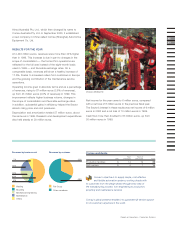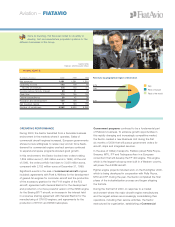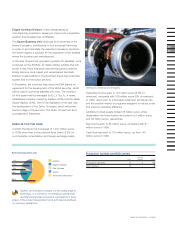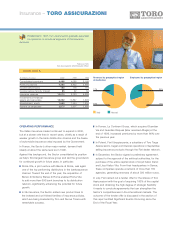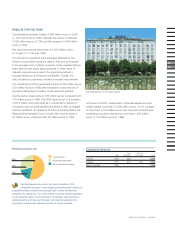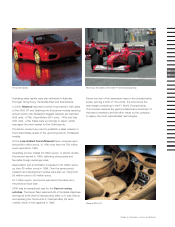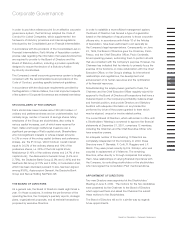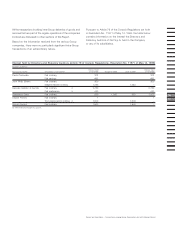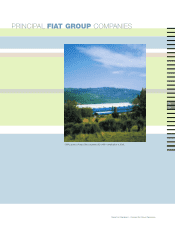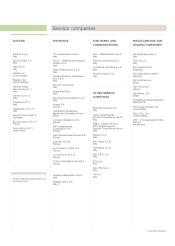Chrysler 2000 Annual Report Download - page 78
Download and view the complete annual report
Please find page 78 of the 2000 Chrysler annual report below. You can navigate through the pages in the report by either clicking on the pages listed below, or by using the keyword search tool below to find specific information within the annual report.
Report on Operations – Corporate Governance
29
28
0
1
2
3
4
5
6
7
8
9
10
11
72
73
14
15
16
17
18
19
20
21
22
23
24
25
26
27
In order to provide a reference point for an effective corporate
governance system, the Fiat Group adopted the Code of
Conduct for Listed Companies, which supplemented the
framework of statutory provisions and internal regulations
introduced by the Consolidated Law on Financial Intermediation.
In accordance with the provisions of the Consolidated Law on
Financial Intermediation, Fiat’s Articles of Association contain
precise rules regarding the information that executive Directors
are required to provide to the Board of Directors and the
Board of Statutory Auditors, including a provision specifically
designed to ensure the election of a Statutory Auditor
by minority stockholders.
The Company’s overall corporate governance system is largely
consistent with the recommendations and provisions of the
Code of Conduct, providing specific behavioral guidelines.
In accordance with the disclosure requirements provided by
the Regulations of Borsa Italiana, the most important aspects
of the system of Corporate Governance are reviewed here below.
STOCKHOLDERS OF THE COMPANY
Fiat’s stockholder base includes about 300,000 holders of
ordinary and preference shares and an undeterminable, but
certainly large, number of owners of savings shares. Many
employees of the Group are stockholders, also owing to
various capital increases, part of which were reserved for
them. Italian and foreign institutional investors own a
significant percentage of Fiat’s capital stock. Shareholders
who hold significant interests or whose interest amounts
to 2% or more of the voting capital (ordinary and preference
shares), are: the IFI Group, which holds an overall interest
equal to 30.5% of the ordinary shares and 19% of the
preference shares, i.e. 28% of the total capital stock;
Mediobanca (3.16% of the ordinary shares and 2.47% of the
capital stock); the Assicurazioni Generali Group (3.4% and
2.75%), the Deutsche Bank Group (2.9% and 2.44%) and the
SanPaolo IMI Group (2.78% and 2.26%). A Consultation Pact,
which has been disclosed pursuant to law, has been signed
among IFI/IFIL, Assicurazioni Generali, the Deutsche Bank
Group and Nuova Holding SanPaolo IMI.
THE BOARD OF DIRECTORS
As a general rule, the Board of Directors meets eight times a
year. On those occasions, it reviews the performance of the
operating Sectors, the Company’s quarterly reports, strategic
plans, organizational proposals, and all material transactions
proposed by executive Directors.
In order to establish a more efficient management system,
the Board of Directors has favored a type of organization
based on the delegation of equal powers to those corporate
officers who, in accordance with Article 18 of the Articles
of Association, have been authorized to act severally as
the Company’s legal representatives. Consequently, on June
23, 1999, the Board of Directors gave the Chairman, Paolo
Fresco, and the Chief Executive Officer, Paolo Cantarella,
broad operating powers, authorizing them to perform all acts
that are consistent with the Company’s purpose. However, the
Chairman has indicated that he intends to primarily focus the
exercise of his functions, in close collaboration with the Chief
Executive Officer, on the Group’s strategy, its international
relationships and negotiations, the development and
enhancement of its human resources and the optimization
of its financial resources.
Notwithstanding the ample powers granted to them, the
Chairman and the Chief Executive Officer regularly submit for
approval to the Board of Directors all transactions that have a
material impact on the Company’s profitability, balance sheet
and financial position, and provide Directors and Statutory
Auditors with adequate information on any transaction
performed by virtue of the powers granted to them which
may be atypical, unusual or involve related parties.
The current Board of Directors, which will remain in office until
a Stockholders’ Meeting is convened to approve the financial
statements at December 31, 2001, comprises 12 members,
including the Chairman and the Chief Executive Officer who
have executive powers.
An adequate number of the remaining 10 Directors are
completely independent of the Company. In 2000, these
Directors were: F. Bernabè, F. Cotti, R. Ruggiero and J.F.
Welch. They were joined recently by F.G. Rohatyn, who was
coopted in replacement of V. Marrone. The remaining
Directors, either directly or through companies that employ
them, have relationships of varying financial importance with
the Company, its controlling stockholders or the stockholders
who have signed the Consultation Pact mentioned above.
APPOINTMENT OF DIRECTORS
Two new Directors were appointed at the Stockholders’
Meeting of June 5, 2000. The motions for the two candidates
were presented by the Chairman to the Board of Directors
which approved them and asked the Chairman the submit
these motions to the Stockholders.
The Board of Directors will act in a similar way as regards
future appointments.
Corporate Governance


